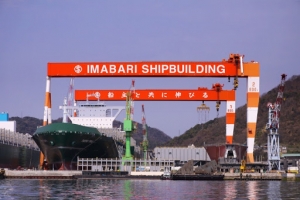


(Posted on 28/04/20)
Leading Classification Society ClassNK has granted an Approval in Principle (AiP) to Imabari Shipbuilding Co., Ltd. for their concept design of a 180,000 DWT LPG dual fuelled bulk carrier developed in cooperation with Mitsubishi Shipbuilding Co., Ltd. The AiP was granted to the concept design based on the Society’s Guidelines for Ships Using Low-Flashpoint Fuels(*1) and its Rule Part GF (regulation for ships using low-flashpoint fuels) incorporating “International Code of Safety for Ships using Gases or other Low-flashpoint Fuels (IGF Code), the current IMO Res. MSC.391(95) and the MSC.458(101) revision planned for release in 2024. This was the first LPG dual fuelled bulk carrier in the world to be granted an AiP.
The main features of the design announced by Imabari Shipbuilding are:
“As one of the merits of this design, it eliminates the necessity for special consideration of boil off gas with this design handling LPG at room temperature and high pressure, which makes the ship’s operation easier. In addition, the ship has been designed with extensive consideration towards cost competitiveness by eliminating to use low-temperature materials such as stainless steel and cryogenic insulation. LPG tank is planned/designed to be installed in the aft area of the bridge and with round-trip distance capacity between Japan and Australia. And, as for supplying LPG to the ship, nowadays, LPG supply bases and infrastructure facilities are globally more developed and improved, which makes the ship’s operation more flexible. This is another motivation to create this design.”
(*1) Alternative fuels besides LNG (Methanol/Ethanol/LPG) have lower flashpoints compared to traditional fuels, therefore particular attention needs to be given to ensuring adequate safety precautions when using low-flashpoint fuels in order to decrease the potential risk of fire and explosions that may arise as a result of fuel leakage onboard the ship. International safety requirements for low-flashpoint fuels have been discussed at IMO and as a result, the International Code of Safety for Ships using Gases or other Low-flashpoint Fuels (IGF Code) has been adopted and enforced. The current code however, does not address specific regulations for alternative fuels other than LNG. Accordingly, in 2019 ClassNK released guidelines that outline safety requirements for other viable alternative fuels besides LNG, based on the latest technology and regulation trends in order to promote the design of alternative fueled ships.
Torvald Klaveness has announced the decision to consolidate all digital services under Klaveness Digital... Read more
The International Association of Dry Cargo Shipowners (INTERCARGO) has renewed its call for straightforward... Read more
The Swedish Club has delivered strong results for 2024, posting a USD 34 million profit and significantly... Read more
In line with NORDEN’s positive long-term outlook for Capesize freight rates, the company have... Read more
OrbitMI, a global provider of maritime software and data products, has expanded its workflow capabilities... Read more
Current ClassNK Senior Vice President Hayato Suga has been appointed as President & CEO as well... Read more
The surge in demand for Cape Size bulk carriers will continue for another six weeks, driven on by increased... Read more
OrbitMI, a leading provider of maritime SaaS software, has announced that Istanbul-based Statu Shipping... Read more
“The International Association of Dry Cargo Shipowners (INTERCARGO) is deeply saddened by the... Read more
As the shipping industry continues its transition to carbon-neutral fuels, ammonia and hydrogen are... Read more